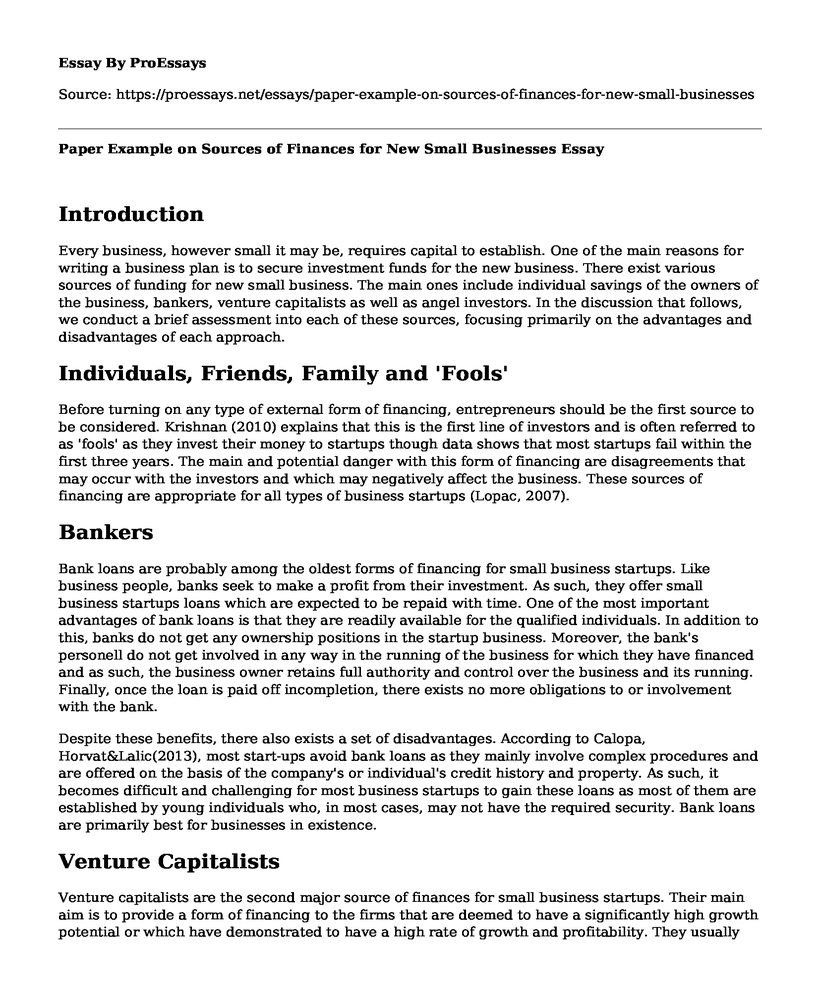Introduction
Every business, however small it may be, requires capital to establish. One of the main reasons for writing a business plan is to secure investment funds for the new business. There exist various sources of funding for new small business. The main ones include individual savings of the owners of the business, bankers, venture capitalists as well as angel investors. In the discussion that follows, we conduct a brief assessment into each of these sources, focusing primarily on the advantages and disadvantages of each approach.
Individuals, Friends, Family and 'Fools'
Before turning on any type of external form of financing, entrepreneurs should be the first source to be considered. Krishnan (2010) explains that this is the first line of investors and is often referred to as 'fools' as they invest their money to startups though data shows that most startups fail within the first three years. The main and potential danger with this form of financing are disagreements that may occur with the investors and which may negatively affect the business. These sources of financing are appropriate for all types of business startups (Lopac, 2007).
Bankers
Bank loans are probably among the oldest forms of financing for small business startups. Like business people, banks seek to make a profit from their investment. As such, they offer small business startups loans which are expected to be repaid with time. One of the most important advantages of bank loans is that they are readily available for the qualified individuals. In addition to this, banks do not get any ownership positions in the startup business. Moreover, the bank's personell do not get involved in any way in the running of the business for which they have financed and as such, the business owner retains full authority and control over the business and its running. Finally, once the loan is paid off incompletion, there exists no more obligations to or involvement with the bank.
Despite these benefits, there also exists a set of disadvantages. According to Calopa, Horvat&Lalic(2013), most start-ups avoid bank loans as they mainly involve complex procedures and are offered on the basis of the company's or individual's credit history and property. As such, it becomes difficult and challenging for most business startups to gain these loans as most of them are established by young individuals who, in most cases, may not have the required security. Bank loans are primarily best for businesses in existence.
Venture Capitalists
Venture capitalists are the second major source of finances for small business startups. Their main aim is to provide a form of financing to the firms that are deemed to have a significantly high growth potential or which have demonstrated to have a high rate of growth and profitability. They usually have high expected returns from their investments in comparison to other forms such as the banks. Unlike banks, they also seek for a corresponding part of the ownership of the business. A major advantage is that they are not affected by the cash flow of the business and does not create any costs for the business (Rakar, 2006). As such, these sources of finances are most appropriate for high-risk business startups with potentially high rates of return on investment.
Angel Investors
The third form of financing are the angel investors. According to Calopa, Horvat&Lalic (2013), business angels are investors who seek to assist entrepreneurs to realize their business ideas. Apart from financing, angel investors assist by sharing their knowledge, experience as well as other non-financial resources not only to start-ups but also to established businesses. Their main motivation to invest in businesses includes making profits, encouraging entrepreneurs, business activity and the creation of new value. Before the angel investors invest in a business startup, a contract must be signed stating and describing the nature of relationship existing between the investor and the investor. These investors are suitable for any form of business.
Conclusion
Individual savings and banks were primarily the main sources of financing of startup businesses in the past. However, as the global economy has continuously grown and developed, the sources of finances for business startups have also greatly increased in their numbers. Each of the above-discussed forms of financing provides a significantly important source of financing for small businesses. However, it is important to note that there exist other many other sources of finances for small business startups.
References
Calopa, M., Horvat, J. &Lalic, M. (2013). Analysis of financing sources for start-up companies. Management, 19(2), 19 - 44.
Krishnan, V. (2010). Friends, Family and Fools. Retrieved 1st June 2018, from http://www.collegefallout.com/friends-family-and-fools/.
Lopac, B. (2007). Kakofinancirati Web startup (How to fund a Web startup). Retrieved 1st June 2018, from http://cromotion.net/76/kako-financirati-web-startup/
Rakar, M. (2006). Venture capital u Hrvatskoj (Venture capital in Croatia). Retrieved 1st June 2018, from http://mrak.org/2006/06/12/venture-capital-u-hrvatskoj/
Cite this page
Paper Example on Sources of Finances for New Small Businesses. (2022, Jun 10). Retrieved from https://proessays.net/essays/paper-example-on-sources-of-finances-for-new-small-businesses
If you are the original author of this essay and no longer wish to have it published on the ProEssays website, please click below to request its removal:
- Essay Sample on Derivatives Options and Swaps
- Research Paper Example on Improvements in the Tourism and Hospitality Field in Morocco
- President Franklin Roosevelt's 100% Tax Plan Essay Example
- Capitalism and Real Estate Essay Example
- Marketing Plan for Onigiri's Case Study Paper Example
- Research Paper on History of Riyad Bank
- Paper Sample on Workplace Bullying: A Culture of Silence in Many US Health Care Settings







